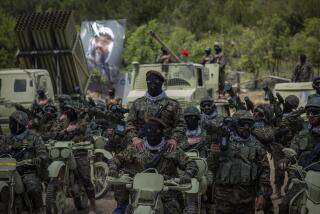In eastern oil city, Libyan rebels brace for attack
- Share via
Reporting from Port Brega, Libya — At the westernmost checkpoint in liberated eastern Libya, a white car pulled up quickly and a man in a bulky black jacket jumped out.
An army from Tripoli is marching this way, he said, a rumor that later proved to be false.
Tawfiq Mangoosh, dressed in jeans and carrying a Kalashnikov with an extra clip stuck in his belt, said volunteers like him are keeping watch for any advancing pro-government militia forces from the west.
“We are the closest point to Kadafi’s forces,” said Mangoosh, 38, who works in the accounting department of the oil company in Port Brega. “If there is going to be a confrontation, it will be here.”
The sprawling city, inhabited mostly by employees of a petroleum and natural gas complex, provides fuel to much of the country, revolutionaries say. Beyond here, Moammar Kadafi’s forces are said to roam the highway that runs along the Mediterranean coast to the next city, Ras Lanuf, another petroleum town that’s at least partly still held by government forces.
What opposition forces are concerned about the most here is an attack by pro-government forces from Surt, one of Kadafi’s few remaining strongholds, 200 miles to the west.
“We are exposed to danger here and we don’t care,” said Mohammad Adam Idrees, 30, who is in charge of the checkpoint.
As well, Surt blocks the coastal route to Tripoli, forcing those eager to fight Kadafi in the capital to take a perilous desert detour.
Since the beginning of the Libyan revolution Feb. 17, men here — and some say women and children too — have been collecting weapons taken from ransacked military barracks and mercenaries who came to attack but were overpowered. The rebels requested more weapons from the larger liberated city of Benghazi to the east, but were told the arms were needed there.
“We’re close to Surt and we’re close to a natural gas line and we’re afraid they will bomb it,” said Ahmad Abdulkarim Sleiman, 27, one of the checkpoint volunteers.
Dressed in a Tommy Hilfiger sweater and gray hoodie pulled over his head, Sleiman casually held the unloaded Kalashnikov he keeps in his house. The men take shifts at multiple checkpoints — including ones leading into the petroleum complex — manned by men in fatigues and jeans. Inside the city of light-colored homes, guns are always nearby.
“If anything is going to come it will come from the west,” said Saleh Issa, a shift supervisor at a chemical plant at the nearby Sirte Oil Company for Production and Manufacturing of Oil and Gas.
At the government-owned plant’s entrance, a billboard that had once displayed the visage of Kadafi had been ripped down. Inside the facility’s power plant control room, a paper flag of pre-Kadafi Libya — the symbol of the eastern rebellion — was pinned to a bulletin board.
“Welcome to Free Libya!” said Braini Abdulnabi, a Libyan who works in the petrochemical plant.
Abdulnabi said protecting the plant from loyalist attack, sabotage or theft is a primary concern. He pointed out that residents have protected the facility, which he said had not been damaged or looted.
“The people know this is their future,” Abdulnabi said.
The complex refines crude oil into gasoline, diesel, jet fuel and heating oil. The fuel remains in eastern Libya to help support the effort to topple Kadafi, workers said.
The facility is guarded by young men in jeans and overcoats, along with a few wearing uniforms. The only weapons in sight are automatic rifles carried by young men at the plant’s main gate.
Saleh Sanoussi, a supervisor at one of the facility’s two power plants, said workers stopped production for a week after the collapse of government control in eastern Libya and restarted it three days ago. He said the company is attempting to meet power needs in the region, “even though we’re very worried about security.”
The complex supplies natural gas for power production here and in major eastern cities such as Benghazi and Tobruk, as well as for some of Tripoli’s needs.
“If we wanted to cut off supplies to Tripoli, we could,” said Said Muhammed, a power plant worker. “But our gas provides power for ordinary people, and we would never cut them off.”
Saleh Hassan, a supervisor for power operations, said the complex is still able to pump significant amounts of crude from desert oil fields about 100 miles south of the plant. He pointed to a control panel listing nine fields — including the main Zelten field. Colored lights indicated that production was active.
Natural gas production is continuing but at reduced capacity, Hassan said. Gas normally exported to Italy has been cut off, he said.
According to workers, the complex normally produces 10,000 barrels a day of petroleum products. They said they did not know current production levels.
“This is the last city, this is an oil city,” said Col. Abdulsalam Abu Shiha, who helps head security efforts at the complex. “It is under complete control of the revolution and we are controlling the oil plants and there is no problem.”
Outside his office, a few men lounged around an automatic gun aimed at the gate. Several feet of rounds lay on the ground, ready.
“Everybody is a soldier,” he said. “Weapons have been distributed to everyone and the people are all around.”
More to Read
Sign up for Essential California
The most important California stories and recommendations in your inbox every morning.
You may occasionally receive promotional content from the Los Angeles Times.















